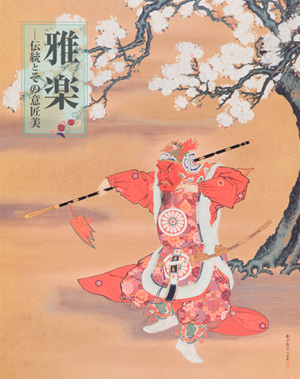| image | information |
|---|---|
 |
Gagaku is one of the many long cultural traditions of the Imperial Court passed down to the present day. Today, the Board of the Ceremonies, Music Department still succeeds the ancient Gagaku traditions, performing on accounts of Court events and also open to the public in Spring and Autumn performances. Gagaku shows the elegance created in the ancient times by mysterious, refined and brilliant music and dance, and its even humorous expression invites viewers into a different time and space, fascinating many people. Furthermore, it has influenced art works greatly, creating a wide variety of designs. In this exhibition, we introduce the musical instruments, music scores, various designs expressed in paintings and craft works, and brilliant designs of costumes used within Gagaku dances, which have been used by the people in the Court as part of their knowledge of arts. There are a number of Gagaku compositions, some coming from the Asian Continent, and some said to have been created within Japan. Japanese songs and verse were connected to the Gigaku and Sangaku that was transcended from the continent during the Nara period, and gradually became a graceful performance. The Imperial Court and powerful temples became related with this situation of formation and their oral tradition, and it became an essential part of Court ceremonies and temple rituals. Therefore, the instruments and costumes used in the Gagaku performances are generally beautifully made with selected materials. They have been continuously created with the superior techniques of each era. The development of the design fostered within this tradition can be seen through the valuable Gagaku music scores, Gagaku books, and paintings from the Heian to Kamakura periods, along with paintings and craft works since the early modern eras, and also contemporary Gagaku costumes. We hope they will enable us to experience one of the traditional cultures our country can be proud of, and be aware of the importance of passing down the Japanese culture. |